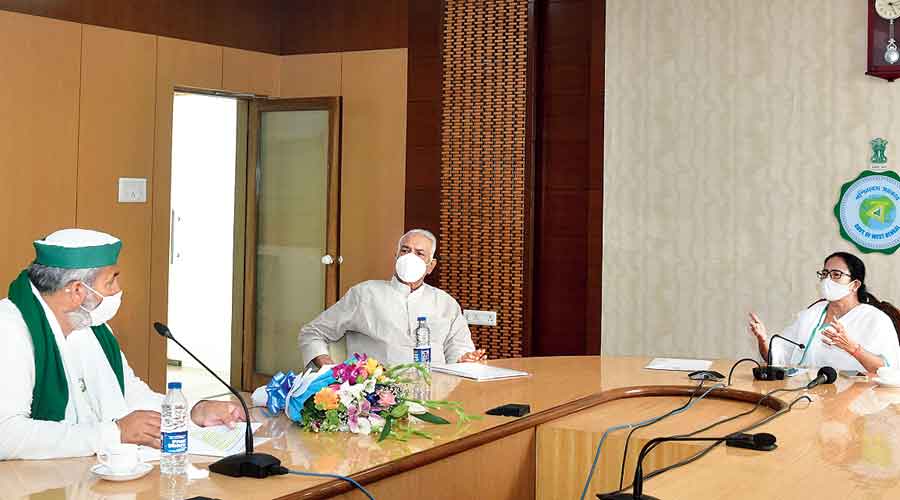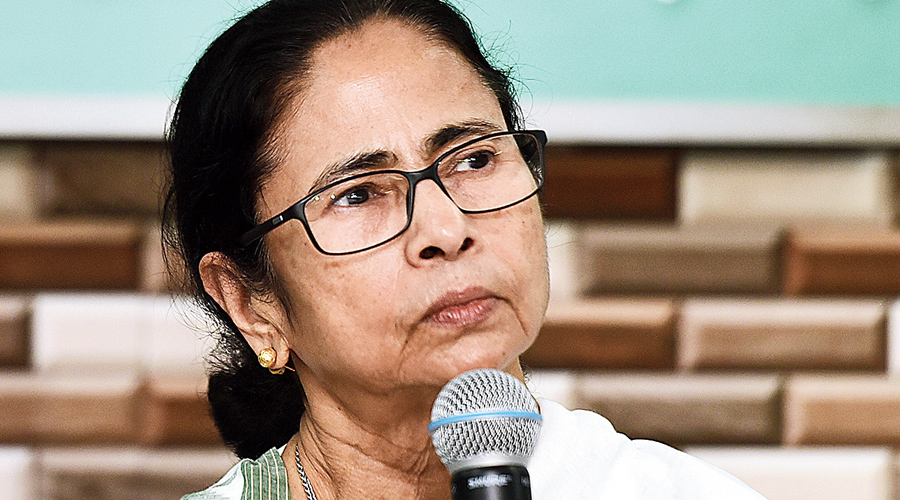Farm leader Rakesh Tikait on Wednesday called on Mamata Banerjee and requested her to consolidate the backing of non-BJP chief ministers across the country for the farmers’ movement, to which she readily agreed and pledged her “full support”.
“Chief ministers opposed to the Narendra Modi government coming together for a conference and issuing a joint statement in favour of the farmers’ movement will create pressure on the Centre to withdraw the anti-farmer laws. Mamataji has promised to take the initiative,” Tikait told The Telegraph after meeting the Trinamul Congress chief and party national vice-president Yashwant Sinha at Nabanna. Tikait was accompanied by Yudhvir Singh, another farm leader.
At a joint news conference after the meeting, Mamata threw her weight behind the peasants’ struggle.
“I assured my full support to the cause of our dear farmers…. The Centre’s indifference towards our farmer brethren is to be blamed for this situation. As I have said earlier, farmers’ rights cannot be compromised in any way and we will together fight every battle to uproot the BJP along with its insensitive, miscalculated policies,” the Bengal chief minister said.
“They requested me to speak to all Opposition chief ministers and gather them for a virtual conference with them…. I will definitely speak to the chief ministers who are my friends,” Mamata added.
“In a federal structure, there should be a union of states so that if the Centre harasses a particular state, the other states can jointly fight it,” Mamata said, demanding to know why none from the Centre had spoken to the agitating farmers since late January.
Asked if she was ready to lead the national Opposition and, perhaps, chair the UPA in the run-up to the Lok Sabha elections in 2024, the Trinamul chief said: “I don’t want to do anything (else)…. I just want to remove Modiji.”
Tikait, a leader of the largest faction of the Bharatiya Kisan Union (BKU) that is part of the Samyukta Kisan Morcha umbrella outfit leading the battle against the three contentious farm laws, said the process of coordination with leaders in the national Opposition would continue.
During the discussions, the farm leaders spoke of measures the Trinamul government could adopt for farmers in Bengal. A BKU leader said Mamata had handed over a document listing the initiatives her government had implemented for farmers.
“We will go through the document and suggest measures we feel the (Bengal) government must implement for the welfare of farmers,” Tikait said later.
According to state government data, Bengal has 71.23 lakh farmer families, of whom 96 per cent are small and marginal cultivators.
“We repeatedly tried to impress on the chief minister that for the survival of the peasantry it is imperative for the Bengal government to provide them adequate price and infrastructure support like cold chains, a marketing network and robust kisan mandis (farmers’ markets),” Tikait said.
He added that the measures should also cover those engaged in fisheries, horticulture, fruit growing and poultry farming.
Tikait urged Mamata to turn Bengal into a “model state” by bringing in a law that guaranteed farmers a minimum support price in keeping with the M.S. Swaminathan Commission’s recommendation to governments to buy crops at a rate one-and-a-half times the cost of production.
“We told Mamataji to turn Bengal into a model state for farmers so that other states can emulate it,” Yudhvir, the BKU (Tikait) general secretary, said.
He stressed the need to keep corporate groups out of the agriculture sector, avoid the establishment of a “company raj” in the state, and at the same time ensure the elimination of conduits.
“We told her the government should take strict action against corrupt government officials who, in nexus with middlemen, deny farmers government benefits. We asked her to ensure that political intervention is eliminated in the purchase of crops by the government,” Singh told this newspaper after the meeting and the media conference.
The BKU leaders asked the state government to promote agri-based industries in Bengal and requested Mamata to ensure that her government’s initiatives such as kisan mandis and the Krishak Bandhu and Bangla Sasya Bima schemes reached the doorsteps of farmers.
A BKU source said the delegation asked the government to consider waiving all kinds of agricultural debt in view of the losses farmers had suffered because of the pandemic and the lockdown. They also stressed the need for a special government package for farmers in the Yaas-affected districts, where land remains inundated with seawater, and crops, fish and cattle have been lost.
“Their land has become uncultivable. They should be given a monthly support of Rs 10,000 for at least two years,” the BKU source said.
Mamata told the news conference that farmers’ rights had always been her foremost priority and formed the basis of her anti-land-acquisition movement in Singur.
“From agriculture to industry, employment generation to Covid-19 (management) --- over the past seven years, this BJP raj has completely destroyed the country... which has become weak and is suffering. The economy is a disaster. The nation now faces twin disasters, natural and political,” she said.
Trinamul has made it clear that it wants to assiduously pursue a national role for itself — a process to be overseen by Trinamul parliamentarian Abhishek Banerjee. Abhishek, Mamata’s nephew, last Saturday took over as the Trinamul national general secretary.
A detailed expansion plan aimed at taking the BJP head-on and win elections in other states is likely to be unveiled within a month.
“This meeting with Tikait amid an Opposition vacuum in the national space and ahead of crucial Assembly elections in seven states next year is not an isolated incident. The party needs all the help possible to get a foot in the door, especially in the Hindi heartland that has a substantial farm community,” a Trinamul source said.












